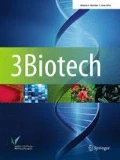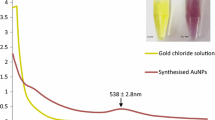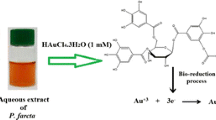Abstract
Among the diverse nanomaterials, gold nanoparticles (AuNps) are utilised for various therapeutic application due to the distinct physical, chemical properties and biocompatibility. Synthesis of gold nanoparticles using plants is the promising route. This method is low cost, eco-friendly and higher biological activities. In this present study, Gold nanoparticles were synthesised from fruit extract of Terminalia bellirica fruit extract. Their anticancer and anti-inflammatory activity was evaluated against colorectal cancer cell line (HT29) and TNBS-induced zebrafish model. Highly stable tannin capped gold nanoparticles were synthesised from fruit extract broth of Terminalia bellirica rapidly. Structural and functional properties of the synthesised nanoparticles were studied by Fourier transform infrared spectroscopy (FTIR), Field Emission Scanning Electron Microscopy (FESEM) equipped with energy-dispersive atomic X-ray spectroscopy (EDAX) and X-ray diffraction (XRD). All the characterisation studies reveal highly stable, crystalline, phytochemicals, mainly tannin doped, spherical, 28 nm controlled sized gold nanoparticles. The molecular mechanism of anticancer activity was studied by determining cancer markers’ expression, which was studied using quantitative real-time polymerase chain reaction (qPCR). Antioxidative enzymes’ status and apoptosis changes were also investigated. Synthesised nanoparticles brought a drastic reduction of all the tested cancer markers’ expression. Notable changes in antioxidative enzymes’ status and a good sign of apoptosis were observed in nanoparticles’ treatment. The anti-inflammatory activity was studied against TNBS-induced zebrafish model, which was confirmed by determining inflammatory markers’ expression TNF-α, iNOS (induced Nitric Oxide Synthase) and histopathological examination. Nanoparticles’ treatment recorded a drastic reduction of inflammatory markers’ expression. No marked sign of inflammation was also observed in histopathological analysis of the nanoparticles’ treatment group. The present study suggests the possible utilisation of T. bellirica-mediated gold nanoparticles as an effective therapeutic agent against a prolonged inflammatory disease that progressively develops into cancer.



















Similar content being viewed by others
Code availability
Not applicable to this study.
References
Arachchige MP, Laha SS, Naik AR et al (2017) Functionalized nanoparticles enable tracking the rapid entry and release of doxorubicin in human pancreatic cancer cells. Micron 92:25–31. https://doi.org/10.1016/j.micron.2016.10.005
Bai Aswathanarayan J, Rai Vittal R, Muddegowda U (2018) Anticancer activity of metal nanoparticles and their peptide conjugates against human colon adenorectal carcinoma cells. Artif Cells, Nanomedicine Biotechnol 46:1444–1451. https://doi.org/10.1080/21691401.2017.1373655
Beigi M, Haghani E, Alizadeh A, Samani ZN (2018) The pharmacological properties of several species of terminalia in the world. Int J Pharm Sci Res 9(10):4079–4088
Bogireddy NKR, Pal U, Gomez LM, Agarwal V (2018) Size controlled green synthesis of gold nanoparticles using Coffea arabica seed extract and their catalytic performance in 4-nitrophenol reduction. RSC Adv 8:24819–24826. https://doi.org/10.1039/c8ra04332a
Carmichael J, Degraff WG, Gazdar AF et al (1987) Evaluation of a Tetrazolium-based semiautomated colorimetric assay : assessment of chemosensitivity testing evaluation of a Tetrazolium-based semiautomated colourimetry assay: assessment. Am Assoc Cancer Res 47:936–942
Chen T, Shi N, Afzali A (2019) Chemopreventive effects of strawberry and black raspberry on colorectal cancer in inflammatory bowel disease. Nutrients 11:1261. https://doi.org/10.3390/nu11061261
Choudhary G (2012) Anti-ulcer activity of the ethanolic extract of Terminalia bellerica Roxb. Int J Pharm Chem Sci 1(4):1293
Deb A, Choudhury G, Barua S, Das B (2016) Pharmacological activities of Baheda (Terminalia bellerica): a review. J Pharm Phytochem 5(1):194
Devi P, Kaleeswari S, Poonkothai M (2014) Antimicrobial activity and phytochemical analysis of fruit extracts of Terminalia bellerica. Int J Pharm Pharm Sci 6(5):639–642
Dharmaratne MPJ, Manoraj A, Thevanesam V et al (2018) Terminalia bellirica fruit extracts: in-vitro antibacterial activity against selected multidrug-resistant bacteria, radical scavenging activity and cytotoxicity study on BHK-21 cells. BMC Complement Altern Med. https://doi.org/10.1186/s12906-018-2382-7
Fernandes AR, Mendonça-Martins I, Santos MFA et al (2020) Improving the anti-inflammatory response via gold nanoparticle vectorization of CO-releasing molecules. ACS Biomater Sci Eng 6:1090–1101. https://doi.org/10.1021/acsbiomaterials.9b01936
Gao W, Wang L, Wang K et al (2019a) Enhanced anti-inflammatory activity of peptide-gold nanoparticle hybrids upon cigarette smoke extract modification through TLR inhibition and autophagy induction. ACS Appl Mater Interfaces 11:32706–32719. https://doi.org/10.1021/acsami.9b10536
Gao W, Wang Y, Xiong Y et al (2019b) Size-dependent anti-inflammatory activity of a peptide-gold nanoparticle hybrid in vitro and in a mouse model of acute lung injury. Acta Biomater 85:203–217. https://doi.org/10.1016/j.actbio.2018.12.046
Habiba K, Aziz K, Sanders K et al (2019) Enhancing colorectal cancer radiation therapy efficacy using silver nanoprisms decorated with graphene as radiosensitizers. Sci Rep 9:1–9. https://doi.org/10.1038/s41598-019-53706-0
Hainfeld JF, Slatkin DN, Focella TM, Smilowitz HM (2006) Gold nanoparticles: a new X-ray contrast agent. Br J Radiol 79:248–253. https://doi.org/10.1259/bjr/13169882
Halliwell B, Gutteridge J (2015) Free radicals in biology and medicine. Oxford University Press, USA
Hao M, Kong C, Jiang C et al (2019) Polydopamine-coated Au-Ag nanoparticle-guided photothermal colorectal cancer therapy through multiple cell death pathways. Acta Biomater 83:414–424. https://doi.org/10.1016/j.actbio.2018.10.032
Hazra K (2019) phytochemical investigation of Terminalia bellirica fruit inside. Asian J Pharm Clin Res 12:191–194
Huang BH, Zhuo JL, Leung CHW et al (2012) PRAP1 is a novel executor of p53-dependent mechanisms in cell survival after DNA damage. Cell Death Dis 3:e442. https://doi.org/10.1038/cddis.2012.180
Kamal R, Chadha VD, Dhawan DK (2018) Physiological uptake and retention of radiolabeled resveratrol loaded gold nanoparticles (99mTc-Res-AuNP) in colon cancer tissue. Nanomedicine Nanotechnology, Biol Med 14:1059–1071. https://doi.org/10.1016/j.nano.2018.01.008
Khan MA, Khan MJ (2018) Nano-gold displayed anti-inflammatory property via NF-kB pathways by suppressing COX-2 activity. Artif Cells, Nanomedicine, Biotechnol 46:1149–1158. https://doi.org/10.1080/21691401.2018.1446968
Khan A (2008). Pharmacodynamic evaluation of Terminalia bellerica for its antihypertensive effect. J Food Drug Analysis https://doi.org/10.38212/2224-6614.2355
Kumar B, Divakar K, Tiwari P, Salhan M, Goli D (2010) Evaluation of the anti-diarrhoeal effect of aqueous and ethanolic extracts of fruit pulp of Terminalia bellerica in rats. Int J Drug Develop Res 2(4):769–779
Kumari S, Kumari P, Panda PK et al (2019) Molecular aspect of phytofabrication of gold nanoparticle from Andrographis peniculata photosystem II and their in vivo biological effect on embryonic zebrafish (Danio rerio). Environ Nanotechnol Monit Manag 11:100201. https://doi.org/10.1016/j.enmm.2018.100201
Latha D, Prabu P, Arulvasu C et al (2018) Enhanced cytotoxic effect on human lung carcinoma cell line (A549) by gold nanoparticles synthesised from Justicia adhatoda leaf extract. Asian Pac J Trop Biomed 8:540–547. https://doi.org/10.4103/2221-1691.245969
Marill J, Mohamed Anesary N, Paris S (2019) DNA damage enhancement by radiotherapy-activated hafnium oxide nanoparticles improves cGAS-STING pathway activation in human colorectal cancer cells. Radiother Oncol 141:262–266. https://doi.org/10.1016/j.radonc.2019.07.029
Namasivayam SKR, Venkatachalam G, Bharani RSA (2020) Immuno biocompatibility and anti-quorum sensing activities of chitosan-gum acacia gold nanocomposite (CS-GA-AuNC) against Pseudomonas aeruginosa drug-resistant pathogen. Sustain Chem Pharm 17:100300
Owaid MN, Al-Saeedi SSS, Abed IA (2017) Biosynthesis of gold nanoparticles using yellow oyster mushroom Pleurotus cornucopiae var. citrinopileatus. Environ Nanotechnol Monit Manag 8:157–162. https://doi.org/10.1016/j.enmm.2017.07.004
Peterson CT, Denniston K, Chopra D (2017) Therapeutic uses of Triphala in ayurvedic medicine. J Altern Complement Med 23:607–614. https://doi.org/10.1089/acm.2017.0083
Rabel AM, Namasivayam SKR, Prasanna M, Bharani RSA (2019) A green chemistry to produce iron oxide—chitosan nanocomposite (CS-IONC) for the upgraded bio-restorative and pharmacotherapeutic activities-Supra molecular nanoformulation against drug-resistant pathogens and malignant growth. Int J Biol Macromol 138:1109–1129. https://doi.org/10.1016/j.ijbiomac.2019.07.158
Roshni K, Younis M, Ilakkiyapavai D, Basavaraju P, Puthamohan VM (2018) Anticancer activity of biosynthesized silver nanoparticles using Murraya koenigii leaf extract against HT-29 colon cancer cell line. J Cancer Sci Ther 10:072–075. https://doi.org/10.4172/1948-5956.1000521
Saha PK, Patra PH, Pradhan R (2011) Effect of Terminalia bellerica & Terminalia chebula on wound healing in induced dermal wounds in Rabbits. Pharmacol Online 2:235–241
Shang C, Cai C, Zhao C, Du Y (2018) Synthesis and anti-inflammatory activity of gold-nanoparticle bearing a dermatan sulfate disaccharide analog. Chinese Chem Lett 29:81–83. https://doi.org/10.1016/j.cclet.2017.06.010
Sharma US, Sharma K, Singh A et al (2010) Screening of Terminalia bellirica fruits extracts for its analgesic and antipyretic activities. Jordan J Biol Sci 3:121–124
Shi M, Paquette B, Thippayamontri T et al (2016) Increased radiosensitivity of colorectal tumors with intra-tumoral injection of low dose of gold nanoparticles. Int J Nanomedicine 11:5323–5333. https://doi.org/10.2147/IJN.S97541
Singh A (2017) Comparative therapeutic effects of plant-extract synthesized and traditionally synthesised gold nanoparticles on alcohol-induced inflammatory activity in SH-SY5Y cells in vitro. Biomedicines 5:70. https://doi.org/10.3390/biomedicines5040070
Singh M, Harris-Birtill DCC, Markar SR et al (2015) Application of gold nanoparticles for gastrointestinal cancer theranostics: a systematic review. Nanomed Nanotechnol Biol Med 11:2083–2098
Singh P, Ahn S, Kang J-P et al (2017) In vitro anti-inflammatory activity of spherical silver nanoparticles and monodisperse hexagonal gold nanoparticles by fruit extract of Prunus serrulata: a green synthetic approach. Artif Cells, Nanomed, Biotechnol 46:1–11. https://doi.org/10.1080/21691401.2017.1408117
Uchide N, Tadera C, Sarai H et al (2006) Characterisation of monocyte differentiation-inducing (MDI) factors derived from human fetal membrane chorion cells undergoing apoptosis after influenza virus infection. Int J Biochem Cell Biol 38:1926–1938. https://doi.org/10.1016/j.biocel.2006.05.014
Uchiyama MK, Deda DK, de Paula Rodrigues SF et al (2014) In vivo and In vitro toxicity and anti-inflammatory properties of gold nanoparticle bioconjugates to the vascular system. Toxicol Sci 142:497–507. https://doi.org/10.1093/toxsci/kfu202
Wang R, Huang J, Chen J et al (2019a) Enhanced anti-colon cancer efficacy of 5-fluorouracil by epigallocatechin-3- gallate co-loaded in wheat germ agglutinin-conjugated nanoparticles. Nanomed Nanotechnol Biol Med 21:102068. https://doi.org/10.1016/j.nano.2019.102068
Wang T, Wang F, Sun M et al (2019b) Gastric environment-stable oral nanocarriers for in situ colorectal cancer therapy. Int J Biol Macromol 139:1035–1045. https://doi.org/10.1016/j.ijbiomac.2019.08.088
Yang H, Kozicky L, Saferali A et al (2016) Endosomal pH modulation by peptide-gold nanoparticle hybrids enables potent anti-inflammatory activity in phagocytic immune cells. Biomaterials 111:90–102. https://doi.org/10.1016/j.biomaterials.2016.09.032
Yuan YG, Peng QL, Ggurunathan S (2017) Silver nanoparticles enhance the apoptotic potential of gemcitabine in human ovarian cancer cells: combination therapy for effective cancer treatment. Int J Nanomedicine 12:6487–6502. https://doi.org/10.2147/IJN.S135482
Zhang P, Darmon A, Marill J et al (2020) Radiotherapy-activated hafnium oxide nanoparticles produce abscopal effect in a mouse colorectal cancer model. Int J Nanomedicine 15:3843–3850. https://doi.org/10.2147/IJN.S250490
Zhong Y, Su T, Shi Q et al (2019) Co-administration of iRGD enhances tumour-targeted delivery and antitumor effects of paclitaxel-loaded PLGA nanoparticles for colorectal cancer treatment. Int J Nanomedicine 14:8543–8560. https://doi.org/10.2147/IJN.S219820
Acknowledgements
We acknowledge SAIF, IIT Madras, India, for the characterisation study of the nanoparticles.
Funding
This research work did not get specific funding from the funding offices in general society, business, or not-revenue-driven sector.
Author information
Authors and Affiliations
Contributions
Equally contributed.
Corresponding author
Ethics declarations
Conflict of interest
We declare that no conflicts of interest.
Ethical approval
Not applicable to this study.
Consent to participate
Not applicable to this study.
Consent for publication
Not applicable to this study.
Rights and permissions
About this article
Cite this article
Namasivayam, S.K.R., Venkatachalam, G., Bharani, R.S.A. et al. Molecular intervention of colon cancer and inflammation manifestation by tannin capped biocompatible controlled sized gold nanoparticles from Terminalia bellirica: A green strategy for pharmacological drug formulation based on nanotechnology principles. 3 Biotech 11, 401 (2021). https://doi.org/10.1007/s13205-021-02944-z
Received:
Accepted:
Published:
DOI: https://doi.org/10.1007/s13205-021-02944-z




